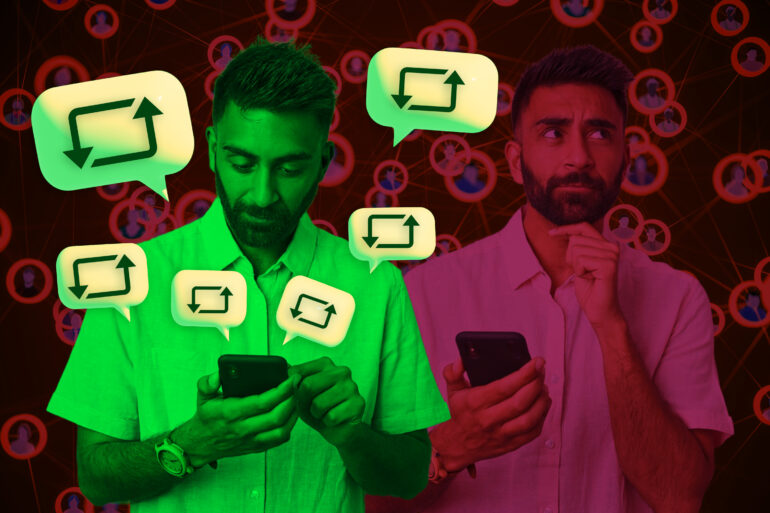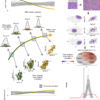As a social media user, you can be eager to share content. You can also try to judge whether it is true or not. But for many people it is difficult to prioritize both these things at once.
That’s the conclusion of a new experiment led by MIT scholars, which finds that even considering whether or not to share news items on social media reduces people’s ability to tell truths from falsehoods.
The study involved asking people to assess whether various news headlines were accurate. But if participants were first asked whether they would share that content, they were 35% worse at telling truths from falsehoods. Participants were also 18% less successful at discerning truth when asked about sharing right after evaluating them.
“Just asking people whether they want to share things makes them more likely to believe headlines they wouldn’t otherwise have believed, and less likely to believe headlines they would have believed,” says David Rand, a professor at the MIT Sloan School of Management and co-author of a new paper detailing the study’s results. “Thinking about sharing just mixes them up.”
The results suggest an essential tension between sharing and accuracy in the realm of social media. While people’s willingness to share news content and their ability to judge it accurately can both be bolstered separately, the study suggests the two things do not positively reinforce each other when considered at the same time.
“The second you ask people about accuracy, you’re prompting them, and the second you ask about sharing, you’re prompting them,” says Ziv Epstein, a Ph.D. student in the Human Dynamics group at the MIT Media Lab and another of the paper’s co-authors. “If you ask about sharing and accuracy at the same time, it can undermine people’s capacity for truth discernment.”
The paper, “The social media context interferes with truth discernment,” will is published March 3 in Science Advances. The authors are Epstein; Nathaniel Sirlin, a research assistant at MIT Sloan; Antonio Arechar, a professor at the Center for Research and Teaching in Economics, in Aguascalientes, Mexico; Gordon Pennycook, an associate professor at the University of Regina; and Rand, who is the Erwin H. Schell Professor, a professor of management science and of brain and cognitive sciences, and the director of MIT’s Applied Cooperation Team.
To carry out the study, the researchers conducted two waves of online surveys of 3,157 Americans whose demographic characteristics approximated the U.S. averages for age, gender, ethnicity, and geographic distribution. All participants use either Twitter or Facebook. People were shown a series of true and false headlines about politics and the COVID-19 pandemic, and were randomly assigned to two groups. At times they were asked only about accuracy or only about sharing content; at other times they were asked about both, in differing orders. From this survey design, the scholars could determine the effect that being asked about sharing content has on people’s news accuracy judgments.
In conducting the survey, the researchers were exploring two hypotheses about sharing and news judgements. One possibility is that being asked about sharing could make people more discerning about content because they would not want to share misleading news items. The other possibility is that asking people about sharing headlines feeds into the generally distracted condition in which consumers view news while on social media, and therefore detracts from their ability to tell truth from falsity.
“Our results are different from saying, ‘If I told you I was going to share it, then I say I believe it because I don’t want to look like I shared something I don’t believe,'” Rand says. “We have evidence that that’s not what is going on. Instead, it’s about more generalized distraction.”
The research also examined partisan leanings among participants and found that when it came to COVID-19 headlines, being prompted about sharing affected the judgment of Republicans more than Democrats, although there was not a parallel effect for political news headlines.
“We don’t really have an explanation for that partisan difference,” Rand says, calling the issue “an important direction for future research.”
As for the overall findings, Rand suggests that, as daunting as the results might sound, they also contain some silver linings. One conclusion of the study is that people’s belief in falsehoods may be more influenced by their patterns of online activity than by an active intent to deceive others.
“I think there’s in some sense a hopeful take on it, in that a lot of the message is that people aren’t immoral and purposely sharing bad things,” Rand says. “And people aren’t totally hopeless. But more it’s that the social media platforms have created an environment in which people are being distracted.”
Eventually, the researchers say, those social media platforms could be redesigned to create settings in which people are less likely to share misleading and inaccurate news content.
“There are ways of broadcasting posts that aren’t just focused on sharing,” Epstein says.
He adds, “There’s so much room to grow and develop and design these platforms that are consistent with our best theories about how we process information and can make good decisions and form good beliefs. I think this is an exciting opportunity for platform designers to rethink these things as we take a step forward.”
More information:
Ziv Epstein et al, The social media context interferes with truth discernment, Science Advances (2023). DOI: 10.1126/sciadv.abo6169. www.science.org/doi/10.1126/sciadv.abo6169
Provided by
Massachusetts Institute of Technology
This story is republished courtesy of MIT News (web.mit.edu/newsoffice/), a popular site that covers news about MIT research, innovation and teaching.
Citation:
On social media platforms, more sharing means less caring about accuracy (2023, March 3)



